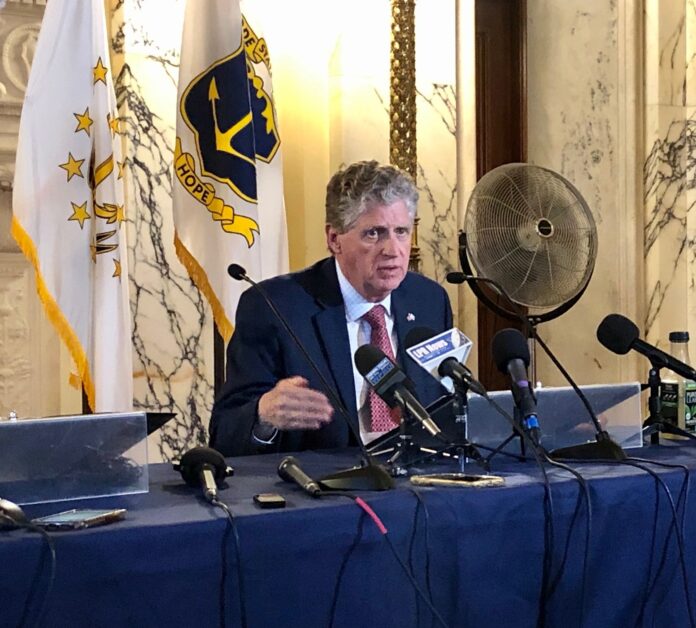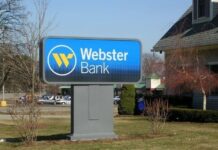
PROVIDENCE – How many ways are there to define a “profit” in business? When it comes to Rhode Island companies that received forgivable Paycheck Protection Program loans, more than they, Gov. Daniel J. McKee and other state Democratic leaders can agree on.
The House on Thursday is set to vote on a $13.1 billion fiscal 2022 state budget that includes a McKee-backed provision that seeks to tax all PPP loans above $250,000. According to the governor and state Democratic legislative leaders, that means that only businesses that managed to make a profit of at least $250,000 during the fiscal 2020 and 2021 tax years would be taxed, and only on what they earned above that threshold.
McKee reiterated the point during his press briefing at the Statehouse on Tuesday.
“Those [affected] companies would have to make a profit of over $250,000 before they pay any Rhode Island taxes,” he said, claiming that applies to just 5% of the state’s businesses.
Larry Berman, spokesman for the House Democratic leaders, offered a similar explanation, saying that the state’s businesses would be “taxed over the $250,000 profit threshold. The first $250,000 is exempt for all [PPP] loans, so they would pay state taxes on profits made beyond $250,000. In other words, if they made $300,000 in profits, they would pay taxes on $50,000.”
But the definition of PPP loans as pure profit therefore subject to taxation is not one affected businesses are familiar with.
John Simmons, spokesman for the R.I. Business Coalition, and former CEO and president of the R.I. Public Expenditure Council, says that PPP loans should not be deemed as revenue collected by businesses. He also notes that the federal government does not allow for the use of PPP funds to be taxed.
Simmons insists the funding was used strictly to pay for expenses, such as payroll, and overhead. “For accounting purposes, it is excess revenue over a company’s expenditures,” he said, noting that in that sense legislators are correct, but for a company the loan is not revenue or profit.
“The state of Rhode Island is going to include the amount of the [PPP loan] as additional income for companies,” said Simmons. “The part that hurts a lot of the businesses is that if they had known about being taxed, they might have run a loss to account for the tax.”
“Rhode Island is saying to these companies that they have to add income [as revenue] that they didn’t expect to add,” added Simmons.
And Simmons adds that the attempt by the state to retroactively tax businesses might be unconstitutional due to a legal precedent set by Peterson v. Commissioner of Revenue in Massachusetts. The case challenged the constitutionality of a law that increased the tax on capital gains in the middle of a tax year.
“That will be reviewed by a lot of employers to see if the state has the right to tax after the fact, which is not good tax principle,” he said. “It shouldn’t be taxable.”
The Rhode Island business community has been vocal in calling for no taxation of the loans. They say that businesses have had to endure the hardships created by the pandemic and imposing a retroactive tax could lead to dire consequences, such as layoffs, downsizing, and closures.
“We think it’s going to be difficult for companies to meet the requirement of the tax,” said Simmons. “We’re already into the second quarter and no payments have been made, so we’re wondering if there will be penalties.”
The governor said on Tuesday that business that received PPP loans greater than $250,000 should not incur any penalties or interest charges for filing their amended tax returns.
Dave Chenevert, director of the R.I. Business Coalition, and executive director of the R.I. Manufacturers Association, said the planned PPP tax is going to be detrimental to the state.
“I think this is going to come back to haunt us,” he said. “Not one manufacturer made a profit on PPP loans. It just did not happen as far as the manufacturers are concerned. That’s the bottom line.”
Some companies, he said, “are going to owe between $500,000 to $700,000, and they don’t even have that money put aside,” Chenevert said. “That is the kicker. So, now what are these businesses going to do?”
Karl Wadensten, president of Richmond-based VIBCO Vibrators, said he has no idea what amount his company will have for tax liability. VIBCO received a PPP loan of $988,542 for tax year 2020.
“No one in the history of this country has had to file an amended tax return like this,” said Wadensten. “It’s going to be disruptive for a lot of businesses – and cost time and money.”
Wadensten said the legislature’s conception of what profit means is wrong as it relates to taxation of the loans. He said that VIBCO applied the loan it received directly to payroll to maintain its workforce, excluding executive personnel.
“At the end of the day when you look at profitability, whether it’s positive or negative, we did everything in our power to reduce being upside down,” he said. “Businesses are not in business to show no profit.”
Craig Pickell, CEO, and president of Lincoln-based Bullard Abrasives since 2000, said his company did not profit and saw a 47% drop in revenue prior to applying for its second-round PPP loan. Pickell noted that the company kept all 104 of its employees throughout the pandemic due to the two rounds of loans it received totaling about $800,000.
He noted that eligibility for the second round of PPP funding called for a minimum 25% drop in company revenue. “That’s how we qualified,” he said. “This is not for the faint of heart. You have to keep a factory running.”
Pickell said that Bullard Abrasives operated its plant four days a week, while using the fifth day to sanitize the facility. The company manufactures abrasive products for use on portable power tools in the metalworking and construction industries.
Companies can’t use PPP funds for sanitization and personal protection equipment, he said. “We were in a really narrow lane with our PPP,” said Slater. “It was just for workers’ wages. Not my wages. And not my partner’s wages.”
As for taxing what was deemed forgivable and nontaxable loans by Congress, Pickell compared it to playing pool.
“It’s like playing barroom pool,” he said. “You better know the rules before you strike the break. This is not the way we should be playing the game. We thought we knew what the rules were at the beginning.”
If approved by lawmakers, Rhode Island would be one of 10 states – and the only one in New England – to tax businesses that received forgivable PPP loans.
Of the $2.6 billion in PPP loans that 30,000 of the state’s businesses received over two fiscal years, less than 2,000 companies, or an estimated 5% of the total, could be taxed on loans greater than $250,000, according to House Speaker K. Joseph Shekarchi.
Cassius Shuman is a PBN staff writer. Contact him at Shuman@PBN.com.













This is not only bad policy but bad politics for the administration and state legislators who support this…..with the excess funding from the Feds why choose this issue to battle over and create yet another reason to not reside in or relocate your business to this state…particularly if you are a successful business? For what……a one time pickup that has a lasting negative impression of the state? Foolish. The state did a lot of good things during the pandemic to help businesses…is this what you want businesses to remember about how the state treated those that were in the most need and managed to actually pull through successfully?
This is a fiasco. “Loan” recipients should have been advised upfront that if they don’t repay the “Loan”, it is treated as taxable income. Gina and Seth should have made that clear. Another ball dropped.